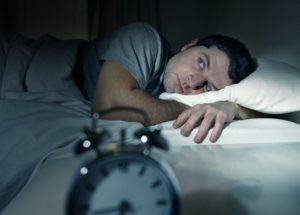Not Getting Enough Sleep? Your Brain Could Be at Risk
October 19, 2019
 If you don’t get enough sleep – which, for most adults, is about 7 to 9 hours every night – it goes without saying that you’ll most likely feel exhausted during the day. Unfortunately, that’s far from your only concern; a lack of sleep has been linked to a wide range of dangerous health issues – including, surprisingly enough, Alzheimer’s disease. Here’s why your mind could be at risk if sleep apnea or another disorder is frequently interrupting your slumber.
If you don’t get enough sleep – which, for most adults, is about 7 to 9 hours every night – it goes without saying that you’ll most likely feel exhausted during the day. Unfortunately, that’s far from your only concern; a lack of sleep has been linked to a wide range of dangerous health issues – including, surprisingly enough, Alzheimer’s disease. Here’s why your mind could be at risk if sleep apnea or another disorder is frequently interrupting your slumber.
What Does a Lack of Sleep Have to Do with Alzheimer’s?
One study published in JAMA Neurology examined the brains of 70 adults with an average age of 76 years and asked them to self-report their sleep patterns and the amount of sleep they had each night. It was found that those who spent more time awake and had their sleep interrupted tended to have a build-up of beta-amyloid plaques in their brain. Said plaques are typically a warning sign of Alzheimer’s disease, the most common form of dementia that slowly destroys memory and thinking skills.
How Can Sleep Apnea Prevent You from Getting Enough Sleep?
Even if you allow yourself plenty of time for sleep every night, sleep apnea could be preventing you from enjoying a quality rest. This disorder continuously interrupts your breathing while asleep (commonly due to a physical obstruction of the airway, although there are cases where sleep apnea is caused by the brain failing to send the proper signals to the muscles responsible for breathing). When the flow of air stops, the body wakes up briefly to resume it. This can potentially happen hundreds of times every night, completely preventing you from reaching the deeper, restorative stages of sleep.
What Can You Do to Make Sure You’re Getting Enough Sleep?
If you want to protect your mind from Alzheimer’s, then it’s essential to make sure you’re spending enough time asleep in bed. Be on alert for signs of sleep apnea; this may include loud snoring and gasping for air, but if you live alone, you’re more likely to notice other symptoms such as frequent exhaustion, irritability, having a sore or dry throat in the mornings, and general forgetfulness. If you believe you have sleep apnea, contact a sleep dentist in Owings Mills right away; after diagnosing your symptoms, they can suggest an appropriate treatment such as oral appliance therapy.
Remember that issues associated with sleep apnea (and sleep deprivation in general) tend to get worse the longer they go unaddressed. However, if you correct the problem and make sure you’re getting plenty of zzz’s every night, it could go a long way towards preventing or slowing the associated health problems – including Alzheimer’s disease. If you believe that you’re suffering from poor quality rest, get in touch with a sleep dentist today!
About the Practice
At Dolfield Dental, Dr. Jacob Milner and Dr. R. Mark Horner are making sure that our patients receive reliable, personalized treatments meant to last. If you find yourself unable to sleep through the night, they can use oral appliance therapy to help relieve your symptoms. To schedule an appointment at our Owings Mills location, visit our website or call (410) 902-4110.
No Comments »
No comments yet.
RSS feed for comments on this post.
